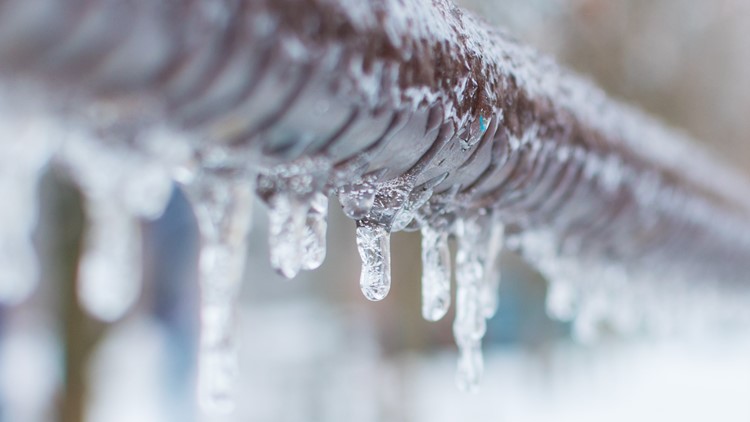Preventing Frozen Plumbing: Top Methods for Cold Weather
Preventing Frozen Plumbing: Top Methods for Cold Weather
Blog Article
They are making several great points about Helpful Tips to Prevent Frozen Pipes this Winter overall in the article further down.
:strip_icc()/snow-outdoor-faucet-pipes-4af65d1e5e904fb1aa7bf74071fe5d89.jpg)
Winter can ruin your pipes, especially by freezing pipes. Here's how to prevent it from taking place and what to do if it does.
Intro
As temperatures drop, the threat of icy pipes increases, possibly causing expensive repairs and water damages. Comprehending how to stop frozen pipelines is important for property owners in cool climates.
Recognizing Frozen Pipelines
What triggers pipelines to freeze?
Pipelines freeze when subjected to temperature levels below 32 ° F (0 ° C) for expanded periods. As water inside the pipelines ices up, it increases, taxing the pipeline wall surfaces and potentially creating them to burst.
Dangers and damages
Icy pipes can cause water system disturbances, residential property damage, and expensive repair services. Burst pipes can flooding homes and cause substantial architectural damages.
Signs of Frozen Pipes
Determining frozen pipelines early can prevent them from breaking.
How to recognize frozen pipes
Seek reduced water circulation from faucets, unusual smells or sounds from pipes, and visible frost on revealed pipelines.
Prevention Tips
Protecting prone pipelines
Wrap pipes in insulation sleeves or utilize warm tape to shield them from freezing temperature levels. Focus on pipelines in unheated or outside areas of the home.
Home heating methods
Keep indoor spaces properly warmed, particularly locations with plumbing. Open up cupboard doors to allow warm air to flow around pipes under sinks.
Shielding Outside Pipes
Garden pipes and outdoor faucets
Separate and drain yard tubes before wintertime. Install frost-proof faucets or cover outside taps with protected caps.
What to Do If Your Pipelines Freeze
Immediate actions to take
If you think icy pipes, keep faucets open up to alleviate pressure as the ice melts. Make use of a hairdryer or towels taken in hot water to thaw pipelines slowly.
Long-Term Solutions
Architectural modifications
Take into consideration rerouting pipes far from exterior walls or unheated locations. Add added insulation to attic rooms, basements, and crawl spaces.
Upgrading insulation
Purchase top quality insulation for pipelines, attic rooms, and wall surfaces. Proper insulation assists preserve regular temperatures and decreases the danger of icy pipelines.
Verdict
Avoiding frozen pipes needs positive procedures and fast feedbacks. By recognizing the reasons, indicators, and safety nets, house owners can secure their pipes throughout cold weather.
Helpful Tips to Prevent Frozen Pipes this Winter
UNDERSTANDING THE BASICS: WHY PIPES FREEZE AND WHY IT’S A PROBLEM
Water freezing inside pipes is common during the winter months, but understanding why pipes freeze, and the potential problems it can cause is crucial in preventing such incidents. This section will delve into the basics of why pipes freeze and the associated problems that may arise.
THE SCIENCE BEHIND FROZEN PIPES
When water reaches freezing temperatures, it undergoes a physical transformation and solidifies into ice. This expansion of water as it freezes is the primary reason pipes can burst. As the water inside the pipe freezes, it expands, creating immense pressure on the walls. If the pressure becomes too great, the pipe can crack or rupture, leading to leaks and water damage.
FACTORS THAT CONTRIBUTE TO PIPE FREEZING
Low Temperatures: Extremely cold weather, especially below freezing, increases the risk of pipes freezing. Uninsulated or Poorly Insulated Pipes: Pipes located in unheated areas, such as basements, crawl spaces, or attics, are more prone to freezing. Insufficient insulation or lack of insulation altogether exacerbates the problem. Exterior Wall Exposure: Pipes running along exterior walls are susceptible to freezing as they encounter colder temperatures outside. Lack of Heating or Temperature Regulation: Inadequate heating or inconsistent temperature control in your home can contribute to frozen pipes. PROBLEMS CAUSED BY FROZEN PIPES
- Pipe Bursting: As mentioned earlier, the expansion of water as it freezes can cause pipes to burst, resulting in significant water damage.
- Water Damage: When pipes burst, it can lead to flooding and water damage to your property, including walls, ceilings, flooring, and personal belongings.
- Structural Damage: Prolonged exposure to water from burst pipes can compromise the structural integrity of your home, leading to costly repairs.
- Mold and Mildew Growth: Excess moisture from water damage can create a favorable environment for mold and mildew growth, posing health risks to occupants.
- Disrupted Water Supply: Frozen pipes can also result in a complete or partial loss of water supply until the issue is resolved.
WHY CERTAIN PIPES ARE MORE PRONE TO FREEZING
- Location: Pipes located in unheated or poorly insulated areas, such as basements, crawl spaces, attics, or exterior walls, are at higher risk of freezing.
- Exterior Pipes: Outdoor pipes, such as those used for irrigation or exposed plumbing, are particularly vulnerable to freezing as they are directly exposed to the elements.
- Supply Lines: Pipes that carry water from the main water supply into your home, including the main water line, are critical to protect as freezing in these lines can affect your entire plumbing system.
- Underground Pipes: Pipes buried underground, such as those connected to sprinkler systems or outdoor faucets, can be susceptible to freezing if not properly insulated.
https://busybusy.com/blog/helpful-tips-to-prevent-frozen-pipes-this-winter/

I ran across that article on How To Avoid Freezing Pipes while browsing on the internet. Kindly take the opportunity to share this article if you appreciated it. Many thanks for being here. Revisit us soon.
Details Here Report this page